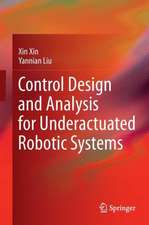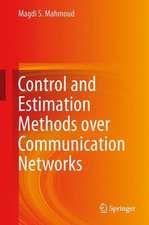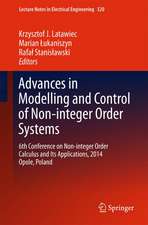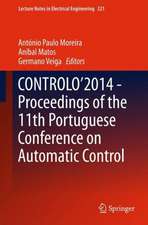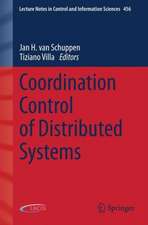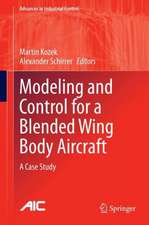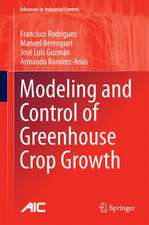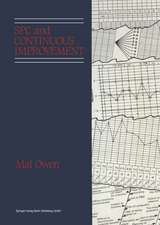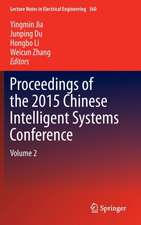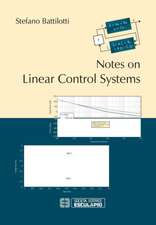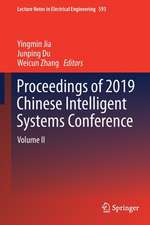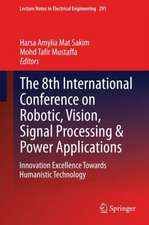Virtual Equivalent System Approach for Stability Analysis of Model-based Control Systems
Autor Weicun Zhang, Qing Lien Limba Engleză Paperback – 6 iun 2021
| Toate formatele și edițiile | Preț | Express |
|---|---|---|
| Paperback (1) | 635.01 lei 6-8 săpt. | |
| Springer Nature Singapore – 6 iun 2021 | 635.01 lei 6-8 săpt. | |
| Hardback (1) | 641.03 lei 6-8 săpt. | |
| Springer Nature Singapore – 6 iun 2020 | 641.03 lei 6-8 săpt. |
Preț: 635.01 lei
Preț vechi: 747.06 lei
-15% Nou
Puncte Express: 953
Preț estimativ în valută:
121.53€ • 126.40$ • 100.33£
121.53€ • 126.40$ • 100.33£
Carte tipărită la comandă
Livrare economică 14-28 aprilie
Preluare comenzi: 021 569.72.76
Specificații
ISBN-13: 9789811555404
ISBN-10: 9811555400
Ilustrații: XIII, 168 p. 100 illus., 15 illus. in color.
Dimensiuni: 155 x 235 mm
Greutate: 0.27 kg
Ediția:1st ed. 2021
Editura: Springer Nature Singapore
Colecția Springer
Locul publicării:Singapore, Singapore
ISBN-10: 9811555400
Ilustrații: XIII, 168 p. 100 illus., 15 illus. in color.
Dimensiuni: 155 x 235 mm
Greutate: 0.27 kg
Ediția:1st ed. 2021
Editura: Springer Nature Singapore
Colecția Springer
Locul publicării:Singapore, Singapore
Cuprins
Motivation and Contents of the Monograph.-Stability and Convergence Analysis of Self-Tuning Control Systems.- Further Results On Stability and Convergence of Self-Tuning Control Systems.- Stable Weighted Multiple Model Adaptive Control: Continuous-Time Plant.- Stable Weighted Multiple Model Adaptive Control: Discrete-Time Stochastic Plant.- Further Results on Stable Weighted Multiple Model Adaptive Control: Discrete-Time Stochastic Plant.- Stability of Continuous-Time T-S Model Based Fuzzy Control Systems.- Appendix A Lemma and proofs for Chapter 2.- Appendix B Lemma and Proofs for Chapter 4.- Appendix C Lemma and proofs for Chapter 6.- Appendix D Lemma and proofs for Chapter 7.
Notă biografică
Weicun ZHANG is an associate professor at the School of Automation and Electrical Engineering, University of Science and Technology Beijing. He obtained his Ph.D. degree in control theory and applications from Tsinghua University in 1993. His research interest covers adaptive control, multiple model adaptive control, intelligent control, and their applications, etc.
Qing Li is a professor at the School of Automation and Electrical Engineering, University of Science and Technology Beijing. He obtained his Ph.D. degree in control theory and applications from University of Science and Technology Beijing in 2000. His research interest covers intelligent control, navigation, path planning and their applications, etc
Qing Li is a professor at the School of Automation and Electrical Engineering, University of Science and Technology Beijing. He obtained his Ph.D. degree in control theory and applications from University of Science and Technology Beijing in 2000. His research interest covers intelligent control, navigation, path planning and their applications, etc
Textul de pe ultima copertă
This book puts forward the concept of a virtual equivalent system (VES) based on theoretical analysis and simulation results. The new concept will facilitate the development of a unified framework for analyzing the stability and convergence of self-tuning control (STC) systems, and potentially, of all adaptive control systems. The book then shows that a time-varying STC system can be converted into a time-invariant system using a certain nonlinear compensation signal, which reduces the complexity and difficulty of stability and convergence analysis. In closing, the VES concept and methodology are used to assess the stability of multiple model adaptive control (MMAC) systems and T-S model-based fuzzy control systems.
Caracteristici
Presents a unified analysis tool to help understand and assess the stability, convergence, and robustness of STC systems Provides a transfer-function block diagram-based interpretation to aid in comprehension Combines theory and analysis with simulation-based verification





